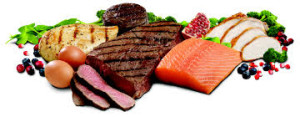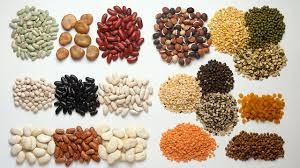Does it really matter, if we eat protein, how much and what kind of protein we consume?
Consider this:
Proteins have many different functions, for example:
- Part of your DNA – your genetic inheritance!
- Enzymes are proteins which make everything happen, e.g. to break down food for absorption; to regulate the entry of nutrients through cell walls, and the removal of waste-products; to grow, develop, move, reproduce.
- Hemoglobin is a protein which, with iron, carries oxygen around the body
- Myoglobin and elastin – These are the two main proteins in muscle fibers
- Bones are mainly proteins, with calcium, magnesium and phosphate;
- Hormones which regulate metabolism
- Antibodies which circulate in blood to protect against infections and
- Keratin which forms hair and nails.
A popular belief among a section of Indians is that protein is required mainly by men, but as we can see above, women also have DNA and Hemoglobin and hormones. Duh!
Protein and Chronic Diseases
There’s growing evidence that high-protein food choices can lower the risk of several diseases and premature death.
Cardiovascular disease
Research conducted at Harvard School of Public Health has found that a high-protein diet may be beneficial for the heart.
A randomized trial known as the Optimal Macronutrient Intake Trial for Heart Health (OmniHeart) showed that a healthy diet that replaced some carbohydrate with healthy protein (or healthy fat) did a better job of lowering blood pressure and harmful low-density lipoprotein (LDL) cholesterol than a similarly healthy, higher carbohydrate diet.
Diabetes
Studies showed that substituting one serving of low-fat dairy products or whole grains for a serving of red meat each day lowered the risk of developing type 2 diabetes by an estimated 16 to 35 percent.
Cancer
Optimum levels of Protein contribute to Optimum Immunity, which can help protect against Cancer.
Osteoporosis
High-protein diets have been linked with increased bone-mineral density, and thus stronger bones.
Protein and Weight Control
The same high-protein foods that are good choices for disease prevention may also help with weight control.
1. Dietary protein reduces hunger. Protein is the most satisfying of all the macronutrients. High protein meals suppress appetite by creating a feeling of fullness. This reduces calorie consumption thereby promoting weight loss.
2. Protein digestion and metabolism burns more calories. Both dietary carbohydrate and protein provide the same amount of available energy, 4 kilocalories per gram, but it takes about 25% more of that energy to process protein. This means more calories are burned in digesting the same weight of protein, compared to carbohydrates.
3. Protein increases lean body mass or muscle. Muscle burns calories. When people shed weight, muscle mass is usually lost. But studies show that overweight dieters are more likely to lose fat instead of muscle by following a higher protein, lower calorie diet. The muscle-building effect of a higher protein diet is further boosted with resistance exercise.
How Much Protein
Experts advise consuming between 1 and 2 grams of protein per kg of body weight. Skew on the higher end for those who are very active, if you’re trying to lose weight, growing children, pregnant women, or the elderly, as they tend to lose muscle mass. Choose the low end for healthy adults.
Even more important: Aim to get at least 30 of those grams at breakfast, says Donald Layman, Ph.D. (That’s roughly the amount you’ll get from two eggs and a cup of cottage cheese.) After fasting all night, the body is running on empty and may start drawing on muscle tissue for fuel if you don’t replenish its protein stores first thing in the morning. Plus, studies have found that protein-rich breakfasts can help regulate appetite all day.
Every meal we eat, every snack we consume, must contain protein to keep blood sugar levels in balance and maintain energy.
You may be Low on Protein if
One of the first signs you’re low on protein: You start craving sweets and feel like you’re never quite full. One of protein’s most critical functions is keeping your blood sugar steady—which means if you’re lacking, your glucose levels will be all over the place, encouraging you to reach for a quick fix like candy.
Your Brain Feels Foggy
Balanced blood sugar is essential for staying focused. So when you’re protein-deprived and your glucose levels are fluctuating constantly, you may feel a little foggy, because you don’t have a steady stream of carbs to fuel your brain. Protein at meals helps time-release the carbs for steady energy rather than up and down spikes. If you’re relying only on “fleeting foods,” such as crackers or bread, you’ll only experience short bursts of mental energy, followed by the fog.
Your Hair is Falling Out
Protein is the building block of all of your cells—your hair follicles included. “If your hair follicles are strong, they keep your hair on your head, despite the tugging we do all day and the wind going through your hair. But if you’re chronically skimping on the scalp-stabilizing nutrient, you may notice that your strands start thinning (although, keep in mind, this can also be a sign of other conditions, like thyroid trouble).
You Feel Weak.
We all know that protein is essential for building muscle. And if you don’t get enough of it, your muscles may start to shrink over time. As a result, you may feel weak and unable to do the exercises you once excelled at.
You Get Sick Constantly
Protein is needed to build all the compounds in our immune systems. So if you seem to catch colds or infections more often than everyone else—and you’re otherwise in good health—a protein deficiency may be to blame.




